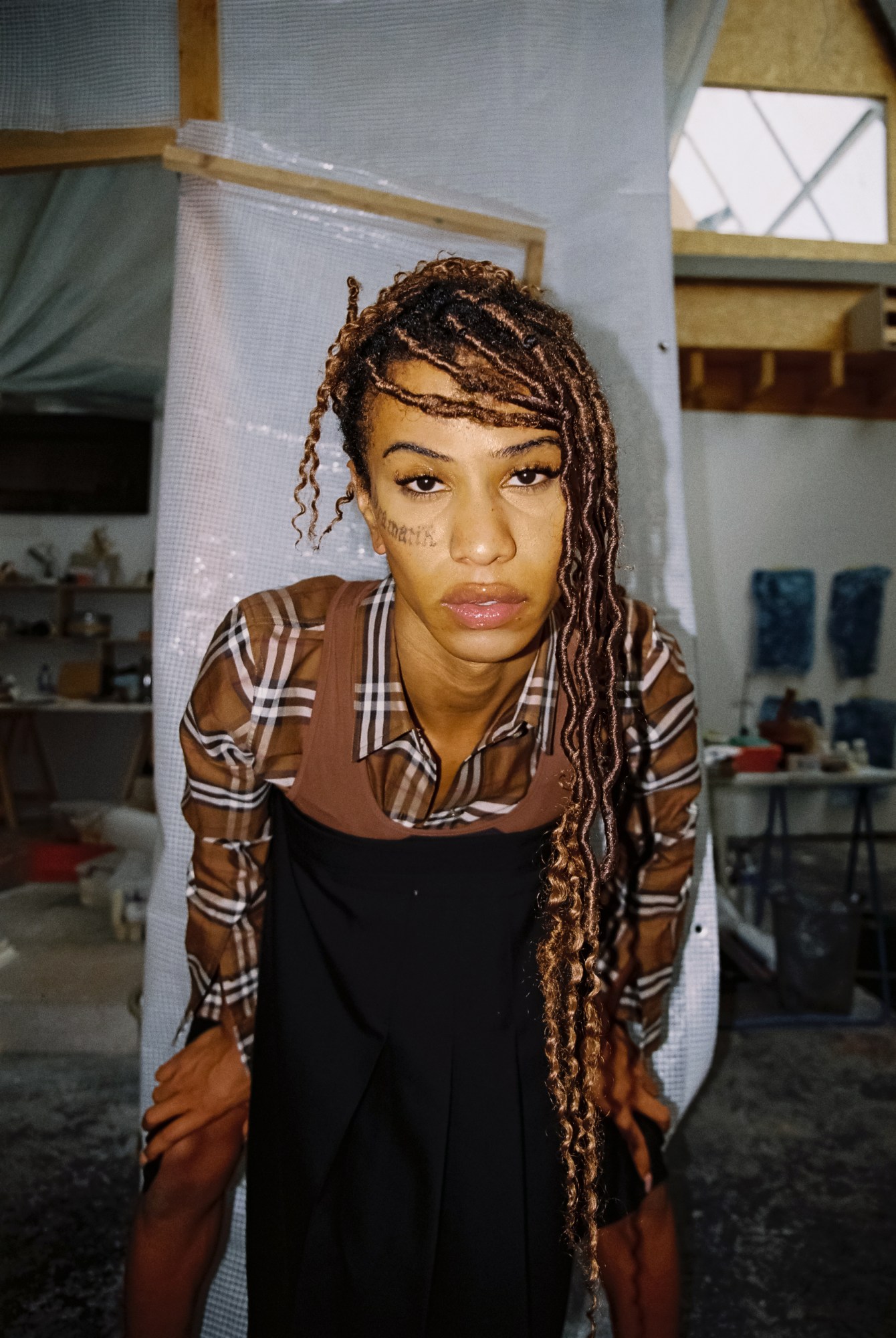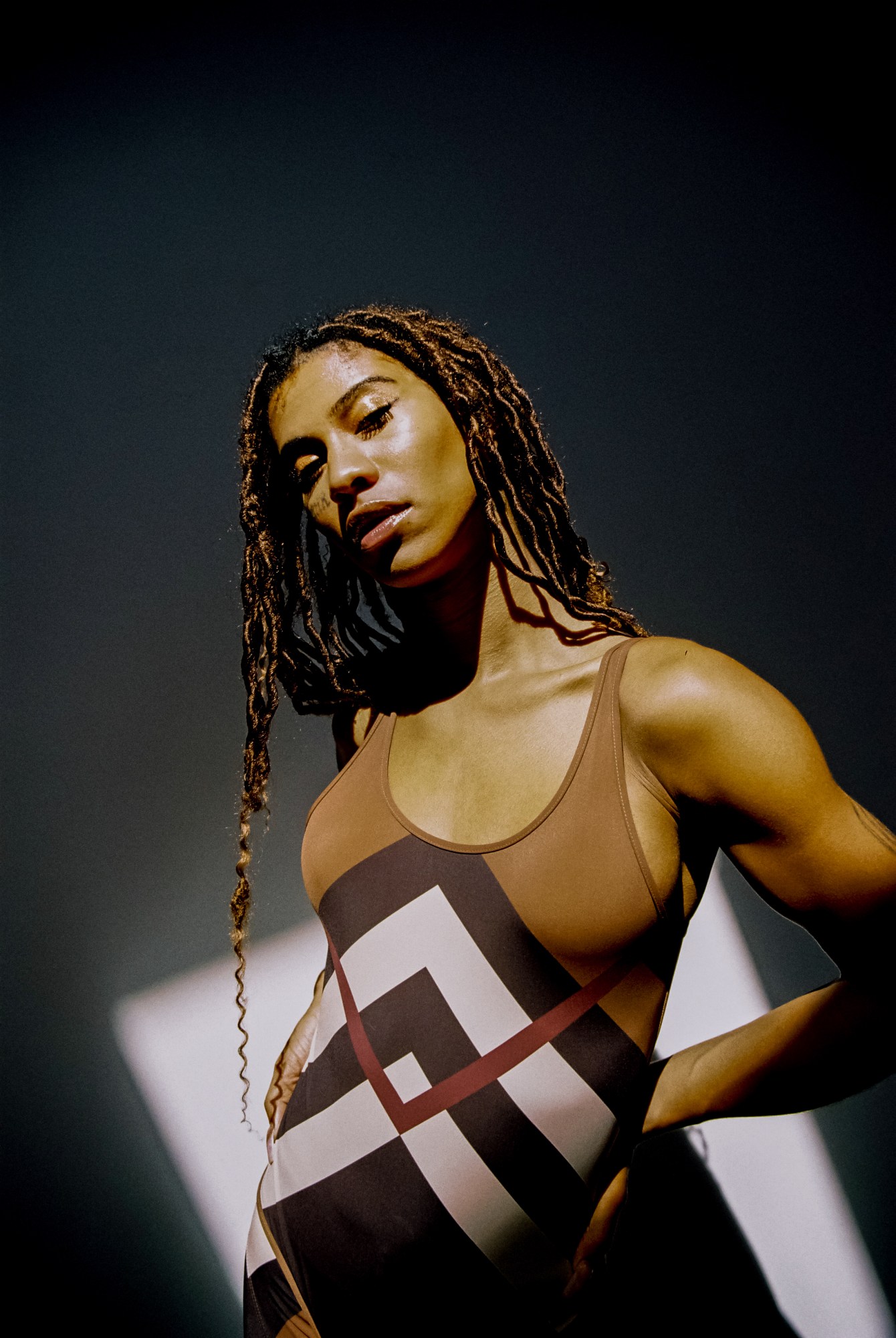Brutal, sexy, anarchic, chaotic: there are all terms that readily come to mind on hearing a set played by Slim Soledad. An increasing mainstay of electronic music scenes in São Paulo, Berlin, Paris and London, her sound is characterised by a bolshy, rough-hewn eclecticism — a musical style that encompasses everything from syncopated, twerk-triggering baile funk to nosebleed-inducing techno; hardstyle bootlegs of pop songs to brain-frying electro.
Gauging by the music for which she’s built her name — earning the co-sign of everyone from the organisers of Herrensauna, one of Berlin’s most authentic, four-to-the-floor parties currently running — to Burberry’s recently departed creative director Riccardo Tisci, you’d be forgiven for expecting a moody reticence from the São Paulo-born DJ and artist. The reality of speaking with Slim, however, is the total opposite. From the very first moment her face flashes up on the screen, the immediate — and lasting — impression of the 25-year-old is one of calm, kindness and warmth. Her speech is peppered with heartfelt “baby”s, and her facial expressions oscillate between moments of sincere contemplation and broad, beaming grins.
Dealing with initial misperceptions like these has become pretty commonplace for Slim. The intense, often esoteric energy of her sets invites readings of sombreness on her part. “Sometimes, when I’m playing, people approach me and say, ‘Oh, your sets are so dark!’,” she exclaims with a giggle, “but I think that’s a matter of misunderstanding. Because for me, even when I’m playing really fast and there’s a chaos to it, there’s also a serenity there. That’s the portal that I’m opening when I’m playing. It’s about embracing the chaos, and not being afraid of it.”

Granted, she understands why some may initially react to her sound with hesitancy, or even fear. These are, after all, the emotions that she first felt on encountering the bruising sounds that she’s now mastered and instinctually plays. “When I first discovered these really fast beats and this chaos, I was actually quite afraid,” she says. “I had no idea what this sort of energy was, and I didn’t know what was going to happen next. But I was then compelled to go deeper to try to discover it,” a decision that has steered the course of her life and career ever since.
Born and raised in Guarulhos, a city on the outskirts of São Paulo’s sprawling metropolitan area close to its main airport, Slim was raised on a musical diet that nourished her yen for tranquillity. “I remember when I was really young, about seven or so, my mum would listen to a station called Antenna 1 while cleaning the house, or just to sing with my dad,” she says, a radio station that near-exclusively broadcasts English-language love songs. They’re songs that she continues to listen to today, especially during her downtime. Rather than the slamming techno and bolshy baile funk that characterises her sets, she’s much more likely to bump a soothing ballad when handed the aux cable at an afterparty. “At the bottom of my heart, I know that it’s way more my vibe. When I’m alone at home, I really don’t listen to the kind of music that I play in the club,” she says. “I actually mostly listen to love songs, something more chill and calm. When my friends come over and want to listen to techno, I’m like, ‘Please, no!” That’s what I work with.”
Still, that hardly diminishes her passion for the music that she does illuminate dancefloors with. Indeed, São Paulo’s party culture is an integral part of Slim’s identity. “Ooh, I started going out when I was very young… like, 12?” she giggles. “I had a lot of older friends that were going to parties, so I guess that’s when I started to realise that there was something there.” It wasn’t until a few years later, though, that she began to fully immerse herself in the scene she went on to shape, when she started taking the long commute into São Paulo’s city centre for dance classes. “I did contemporary, vogue hands… I even did circus for a year!” she reminisces. Rapidly assimilating into São Paulo’s queer underground, she eventually came across Brazilian funk singer and drag queen Lia Clark, with whom she danced for a year and a half.

It was shortly after she began venturing into São Paulo’s centre, though, that Slim’s most significant and enduring contribution to the city’s night culture began. “That was when I started doing parties with the collective I’m part of in Brazil: Chernobyl.” Granted, it’s an eyebrow-raising title for a party series, but the intention behind the name was to clap back against the abuse that Slim and other members of the trans and gender non-conforming POC communities she’s part of regularly faced. “When we first created it, our main intention was to create a safe space for people like us,” she says. “A space where people could feel free to be naked or whatever, and just feel safe. That’s actually where the name came from. XD Eric [one of Chernobyl’s co-founders] was being harassed on the internet, receiving comments like ‘Go back to Chernobyl!’ It was really about embracing those names — saying, sure we can be from what you call ‘Chernobyl’, but we’ll show you how great that can be!”
Six years on from then, the party has bloomed into one of the most significant presences in the São Paulo underground, with the party’s genesis now widely referenced as a watershed moment for trans representation and visibility in the scene. “We were the first party to do a free entry list for trans people,” Slim beams, a move that has helped to bridge the gap between the often clashing communities that occupy the city by night, and has since become common practice. “In the centre of São Paulo, where we threw the first Chernobyl parties, there are a lot of trans women sex workers on the streets. We thought that they might like to come and party with us, and we wanted to ensure they didn’t have to pay — we just wanted to create an environment that they could be part of, too. We wanted to create a safe space for ourselves, but also for people that don’t usually go to the club because they’re working.”
It was also here that she first took to the decks — the primary reason for that being a practical one. “Well, we were throwing these parties, but we didn’t actually have the money to pay people, so we just decided to do it ourselves,” she says. “It really made me discover how much I loved it, though, especially the connection you build with the crowd.” This relationship, however, wasn’t always mutual. “When I started at Chernobyl, the dancefloor was always empty. Everybody was like, ‘Ah she isn’t playing Brazilian funk, she just likes mixing a lot of shit!’, I just had to keep at it and educate them, because that’s part of the responsibility of being a DJ. You’re laying out your personal research, and introducing your audience to something that they’re maybe not used to listening to on a daily basis.”

Having built some confidence, she started uploading sets to Soundcloud, expanding her fanbase far beyond Brazilian borders. “I started to see that European audiences were actually more into my sets than they were in Brazil, so I started to consider moving there.” The chance to transplant across the Atlantic then came when she embarked on an EU tour supporting trans-disciplinary artist Linn da Quebrada four years ago, the first stop of which was Berlin — a city she felt at home in from the word go. “I just felt that there was something here for me, especially because of the night scene,” she says. “It’s so big and diverse, and, in my opinion, it’s definitely the best night scene in Europe. It’s also so accessible in terms of making music. There are so many studios and radio stations, which you really don’t have to pay that much to use. I knew that if I wanted to focus on a music career, that was where I needed to be.”
Her choice has paid dividends — in the four years since making the move, she’s since risen the city’s ranks, playing at scene-shaping parties and clubs like Herrensauna, Maricxs and Trauma Bar, and is gearing up to release her first EP in early 2023. Increasingly, she’s also becoming a name-to-know in other European electronic music capitals, playing at Krakow’s Unsound, Barcelona’s Primavera Sound, and at Inferno, and the recent Burberry afterparty in London, all in the last few months.

Her rising profile has also encouraged her to expand her platform beyond music, branching out into acting and modelling. The latter endeavour was catalysed by a chance encounter with Riccardo Tisci at a bar in Berlin. “I didn’t actually realise who he was at first,” she laughs. “I was with my friend [Brazilian contemporary artist] Jota Mombaça, who said she was going to meet Lea T” — one of the fashion industry’s first major trans models, and Riccardo’s longstanding muse. An evening spent with the Italian designer sparked a deep creative and personal friendship, one that saw Slim integrated into his chosen family, appearing in Burberry’s campaigns and on its front rows, and playing at the brand’s events across Europe. “It’s a relationship of love and respect. I admire Riccardo so much, and I know that he really sees me as a talent,” she says. “He’s also supported me in ways beyond work. When I did my Gofundme for my gender-affirming surgeries, he helped me through my journey. We’ve built a relationship that I value so much. It’s so difficult to find people in the fashion industry with that sort of sensitivity to them.”
It’s a sensitivity that palpably emanates from Slim herself. Though the past few years may have seen her court the attention of major players in the luxury fashion and electronic music scenes, and paved the way for a generation of queer and POC Brazilian creatives currently making waves in Paris, London and Berlin, her motivations remain as humble and community-oriented as when she first started Chernobyl. “I just want to do something unique and memorable. I don’t mean that in terms of being memorable for the world, but rather for the people that are around me,” she says. “I want to support my community, I want to support my friends, I want to support my family… That’s ultimately what pushes me forward.”


Credits
Photography Fernanda Liberti
